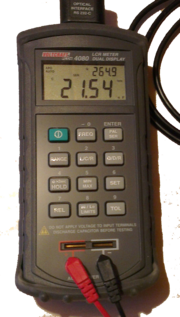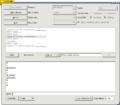Difference between revisions of "Voltcraft 4080"
(images of PCB, display, communication port) |
(reference Extech 380193) |
||
| (4 intermediate revisions by the same user not shown) | |||
| Line 2: | Line 2: | ||
| image = [[File:Voltcraft4080_2.png|180px]] | | image = [[File:Voltcraft4080_2.png|180px]] | ||
| name = Voltcraft 4080 | | name = Voltcraft 4080 | ||
| status = | | status = supported | ||
| source_code_dir = serial-lcr | | source_code_dir = serial-lcr | ||
| counts = 20000 | | counts = 20000 | ||
| Line 12: | Line 12: | ||
}} | }} | ||
The '''Voltcraft 4080''' is an LCR meter with USB connectivity. | The '''Voltcraft 4080''' is an LCR meter with USB connectivity. It is described as 4.5 digits (20000 count) LCR meter with 0.5% basic accuracy (resistance) that can measure at 120Hz and 1kHz, and comes with USB connectivity (serial protocol). | ||
The ''' | The [[Peaktech 2165]] appears to be another rebrand. '''Extech 380193''' looks like another compatible. | ||
== Hardware == | == Hardware == | ||
| Line 31: | Line 31: | ||
File:Voltcraft4080_complete.jpg|<small>Device, top</small> | File:Voltcraft4080_complete.jpg|<small>Device, top</small> | ||
File:Voltcraft4080_cutecom.png|<small>Terminal session</small> | File:Voltcraft4080_cutecom.png|<small>Terminal session</small> | ||
</gallery> | </gallery> | ||
| Line 86: | Line 80: | ||
[[Category:Device]] | [[Category:Device]] | ||
[[Category:LCR meter]] | [[Category:LCR meter]] | ||
[[Category: | [[Category:Supported]] | ||
Latest revision as of 08:05, 17 May 2020
 | |
| Status | supported |
|---|---|
| Source code | serial-lcr |
| Counts | 20000 |
| IEC 61010-1 | — |
| Connectivity | USB, RS232 |
| Measurements | resistance, capacitance, inductance |
| Features | autorange, relative, auto-poweroff, min-max, tolerance |
| Website | conrad.com |
The Voltcraft 4080 is an LCR meter with USB connectivity. It is described as 4.5 digits (20000 count) LCR meter with 0.5% basic accuracy (resistance) that can measure at 120Hz and 1kHz, and comes with USB connectivity (serial protocol).
The Peaktech 2165 appears to be another rebrand. Extech 380193 looks like another compatible.
Hardware
LCR meter:
- TI TLC7135C ADC, 4 1/2 digits, 1Ksa/s
- TI MSP430 MCU
- several discrete TI components
USB to IR cable:
- FT232R, regular serial port, bidirectional (RX and TX LED)
Photos
Protocol
Serial communication runs at 1200/7e1, uses ASCII characters and is basically human readable. You can access the device with e.g. a terminal program like CuteCom.
Serial packets consist of 39 ASCII characters that end in the CR-LF termination, contain a lot of single character flags, as well as multiple multi-character fields for the primary and secondary displays.
The description of the commands you find at Conrad. The PeakTech 2165 user manual has another description, represented differently.
When the device does not respond it might be in setup mode. You can see that in the display. But the software can not. So it might be a good idea to do an initialization with [BXXXXXX] to stop the setup mode. This only works for a setup mode that was requested by an earlier remote session. You can not leave a manual setup mode this way.
Some findings not mentioned in the protocol definition above; without waranty:
Disabling keys
Sending
A
responds with
REMOTE READY..
and says RS232 in the display.
Keys on device are disabled.
Enabling keys
Sending
B
responds with
REMOTE STOP...
Keys on device are enabled.
Resources
- Voltcraft 4080 product page at Conrad
- Protocol summary at Conrad
- PeakTech 2165 product page
- PeakTech user manual bilingual (German/English), see chapter 7 for the protocol

